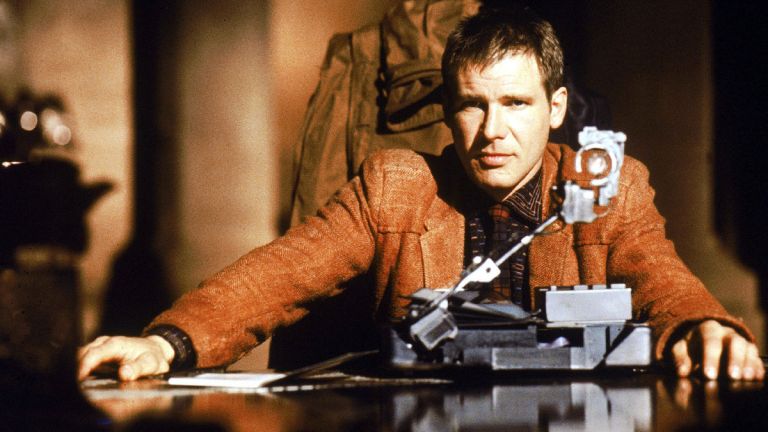Harrison Ford Finally Has a Definitive Answer for Blade Runner’s Biggest Mystery
For years, Harrison Ford and Ridley Scott have had opposing interpretations about the replicant at the center of Blade Runner. But Ford is finally ready to relent.

I’m going to ask you a series of questions. Just relax and answer them as simply as you can. It’s your birthday, someone gives you a calfskin wallet. You’ve got a little boy, he shows you his butterfly collection, plus the killing jar.
For years, Ridley Scott and Harrison Ford had very different ideas about how Deckard, the character Ford played in Scott’s 1982 movie Blade Runner, would respond to those questions/statements. After all, they come from the Voight-Kampff Test, an examination of empathy used to distinguish between human beings and replicants, the artificially created organic beings that Blade Runners like Deckard hunt down and “retire.” Scott had long maintained that Deckard himself was a replicant, resulting in a delicious irony at the center of the film. However, Ford followed the version of Deckard in the source material, the 1968 Philip K. Dick novel Do Androids Dream of Electric Sheep?, in which the protagonist was explicitly human.
But in a recent career retrospective with Esquire, Ford revealed his true stance. “I always knew that I was a replicant,” he said with more than a little frustration. “I just always wanted to push back against it, though.” That claim is a strong reversal from what Ford said in a 2006 episode of the BBC One series Hollywood Greats. “I thought the audience deserved one human being on screen that they could establish an emotional relationship with,” he told host Jonathan Ross. “I thought I had won Ridley’s agreement to that, but in fact I think he had a little reservation about that. I think he really wanted to have it both ways.”
Indeed, most people who worked on the film agreed with Ford’s take, including screenwriter Hampton Fancher, who told The Telegraph, “It wasn’t like I had a tricky idea about Deckard that way.” Various other actors and crew people shared this view, insisting that they approached the movie’s central character as a human looking for replicants, not a tragic figure unaware of the irony in his job.
But by the time he was doing press for the Denis Villenueve-directed sequel Blade Runner 2049, Ford backed off his original assistance. “It was resolved,” Ford said when the debate came up in a Vice documentary. But when asked for an answer, the famously irascible actor refused to play nice. When asked directly if Deckard was an android replicant or not, he would only say: “I cannot tell you!” he insisted. “Because then that question will go away and people will not have that pleasure of debating it.”
With the world of skinjobs behind him after Blade Runner 2049, Ford seems to have grown tired of the debate. “I think a replicant would want to believe they were human,” he said to Esquire about Deckard. “At least this one did.” And with that final statement, Ford shows a surprising level of empathy toward Deckard, something that administrators of the Voight-Kampff Test would find very interesting.
